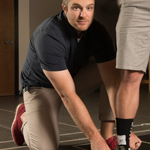- Name: Richard S. Beard, Jr., Ph.D.
- Institution: Boise State University
- Department: Biomolecular Research Center
- Phone: 208-241-8154
- Email: richardbeard@boisestate.edu
- Website: https://microvascularpathology.com
Summary: Our lab focuses on microvascular pathobiology and the elucidation of mechanisms for endothelial barrier dysfunction during aberrant inflammatory responses. Though all endothelial cells throughout the vascular system have some barrier properties, the blood-brain barrier (BBB) endothelia in the brain microcirculation is the most finely-tuned and structurally competent. BBB dysfunction is a key pathologic component of several CNS diseases associated with aberrant inflammation such as multiple sclerosis, Parkinson’s, traumatic brain injury, stroke, Binswanger’s, and Alzheimer’s disease. We our particularly interested in the signal transduction that controls endothelial cell-cell adhesion in both homeostasis and inflammation. What impels us the most to continue studying this topic is it’s potential to have a major impact on a multitude of disorders that contribute to a substantial economic burden on our society.
Minimum classes: We will consider students at all stages, but prior coursework in Anatomy and Physiology, Immunology and/or Cell Biology would be preferred.
Projects:
We are looking for motivated students to join our team working on two overarching projects:
1) Cytokine-induced transcriptional repression of endothelial tight junctions during inflammatory responses.
2) The influence of matrix-endothelial interactions on endothelial cell-cell adhesion.
Our team employs a multifaceted experimental approach ranging from state-of-the-art molecular and cell biology techniques in vitro, to extensive pathophysiological analyses of relevant disease models in vivo:
In vivo: we use genetically altered mice (inducible endothelial-specific knockout), or pharmacotherapy, to modulate the BBB during inflammatory challenge (experimental autoimmune encephalomyelitis). We evaluate the effects of these modulations by measuring several endpoints, such a BBB permeability, neutrophil extravasation, white matter demyelination, and/or neuronal damage.
In vitro: we model the BBB with primary endothelial cells isolated from the genetically modified mice, or purchased human primaries. Following challenge with inflammatory cytokines, we measure endothelial barrier function with solute permeability assays or transendothelial electrical resistance (TEER).
Other techniques we employ include: Immunocytochemistry, Flow cytometry, Western blotting, PCR, molecular cloning, live-cell imaging, and more…



